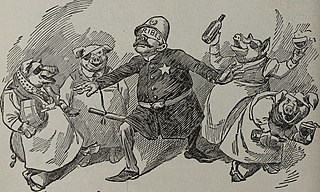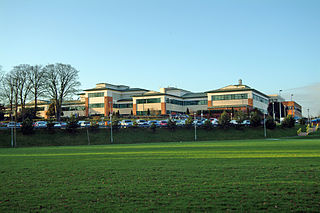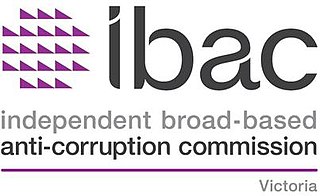
Stephen Lawrence was a black British 18-year-old from Plumstead, southeast London, who was murdered in a racially motivated attack while waiting for a bus in Well Hall Road, Eltham, on the evening of 22 April 1993. The case became a cause célèbre: its fallout included changes of attitudes on racism and the police, and to the law and police practice. It also led to the partial revocation of the rule against double jeopardy. Two of the perpetrators were convicted of murder on 3 January 2012.

Police corruption is a form of police misconduct in which law enforcement officers end up breaking their political contract and abusing their power for personal gain. This type of corruption may involve one or a group of officers. Internal police corruption is a challenge to public trust, cohesion of departmental policies, human rights and legal violations involving serious consequences. Police corruption can take many forms, such as: bribery, theft, sexual assault, and discrimination.

The Rampart scandal was a police corruption scandal which unfolded in Los Angeles, California during the late 1990s and early 2000s. The scandal concerned widespread criminal activity within the Community Resources Against Street Hoodlums (CRASH) anti-gang unit of the Los Angeles Police Department's Rampart Division. More than 70 police officers were initially implicated in various forms of misconduct, including unprovoked shootings and beatings, planting of false evidence, stealing and dealing narcotics, bank robbery, perjury and cover-ups thereof.

Monitor was an executive non-departmental public body of the Department of Health, responsible between 2004 and 2016 for ensuring healthcare provision in NHS England was financially effective. It was the sector regulator for health services in England. Its chief executive was Ian Dalton and it was chaired by Dido Harding. Monitor was merged with the NHS Trust Development Authority to form NHS Improvement on 1 April 2016.
The history of the Metropolitan Police in London is long and complex, with many different events taking place between its inception in 1829 and the present day.

The Stafford Hospital scandal concerns poor care and high mortality rates amongst patients at the Stafford Hospital, Stafford, England, during the first decade of the 21st century. The hospital was run by the Mid Staffordshire NHS Foundation Trust, and supervised by the West Midlands Strategic Health Authority. It has been renamed County Hospital. The scandal also resulted in the resignation of NHS Chief Sir David Nicholson in 2013.

The Mid Staffordshire NHS Foundation Trust was a NHS foundation trust which managed two hospitals in Staffordshire, England:

County Hospital is an acute hospital with less than 200 inpatient beds, opened in 1983. It is the main hospital in Stafford, England. The hospital is managed by University Hospitals of North Midlands NHS Trust. County Hospital's Accident and Emergency unit is the only such facility in Stafford. Wards at County Hospital are numbered, with the exception of specialist units. The hospital changed its name on 1 November 2014 from Stafford Hospital to County Hospital as part of the dissolution of the Mid Staffordshire NHS Trust.

Daniel John Morgan was a British private investigator who was murdered with an axe in a pub car park in Sydenham, London, in 1987. Despite several Metropolitan Police investigations, arrests, and trial, the crime remains unsolved. An independent review into the handling of the investigation of Morgan's killing was published in 2021; it found that the Met Police had "a form of institutional corruption" which had concealed or denied failings in the case.
Jonathan Rees is a British private investigator, and former partner of murdered private investigator Daniel Morgan.

The Leveson Inquiry was a judicial public inquiry into the culture, practices, and ethics of the British press following the News International phone hacking scandal, chaired by Lord Justice Leveson, who was appointed in July 2011. A series of public hearings were held throughout 2011 and 2012. The Inquiry published the Leveson Report in November 2012, which reviewed the general culture and ethics of the British media, and made recommendations for a new, independent body to replace the existing Press Complaints Commission, which would have to be recognised by the state through new laws. Prime Minister David Cameron, under whose direction the inquiry had been established, said that he welcomed many of the findings, but declined to enact the requisite legislation. Part 2 of the inquiry was to be delayed until after criminal prosecutions regarding events at the News of the World, but the Conservative Party's 2017 manifesto stated that the second part of the inquiry would be dropped entirely, and this was confirmed by Culture Secretary Matt Hancock in a statement to the House of Commons on 1 March 2018.

The Furness General Hospital scandal involves an investigation by Cumbria Constabulary and other government and public bodies into the deaths of several mothers and newborn babies, during the 2000s at Furness General Hospital (FGH) in Barrow-in-Furness, Cumbria, England. Cases date back to 2004, with a number of major incidents occurring in 2008. The death of Joshua Titcombe and a suppressed report by the Morecambe Bay NHS Trust brought the spotlight onto FGH in 2011 when investigations began. Claims of medical records being intentionally destroyed alongside the discovery of major wrongdoing on behalf of midwives led to threats of closure to the maternity ward.
This article provides a narrative beginning in 1999 of investigations by the Metropolitan Police Service (Met) of Greater London into the illegal acquisition of confidential information by agents in collaboration with the news media that is commonly referred to as the phone hacking scandal. The article discusses seven phases of investigations by the Met and several investigations of the Met itself, including critiques and responses regarding the Met's performance. Separate articles provide an overview of the scandal and a comprehensive set of reference lists with detailed background information.

Julie Dawn Bailey CBE is a cafe owner who was a central figure in the Stafford Hospital scandal.
Mark Ellison KC is a British barrister and member of QEB Hollis Whiteman chambers.
Sir Robert Anthony Francis KC is a British barrister. He specialises in medical law, including medical and mental health treatment and capacity issues, clinical negligence and professional discipline. He has appeared as a barrister for and chaired several high-profile inquiries into medical controversies/scandals.

The Independent Broad-based Anti-corruption Commission (IBAC) is Victoria's anti-corruption integrity agency with jurisdiction over the public sector. It does this by:

Kate Blackwell KC is a British barrister. Head of Chambers at Lincoln House Chambers in Manchester, she became a Crown Court Recorder in 2009 and Queen's Counsel in 2012. Blackwell has been described by The Guardian as a ‘no-nonsense prosecutor’.

The Undercover Policing Inquiry is an independent statutory inquiry into undercover policing in England and Wales. It was announced by Theresa May, the then Home Secretary, on 6 March 2014, and its terms of reference were published on 16 July 2015. The Inquiry has been chaired by Sir John Mitting since July 2017, following the resignation due to ill-health of Sir Christopher Pitchford.
Graeme McLagan is a British journalist who was Home Affairs correspondent for BBC News, specialising in crime and the police about which he has written three books.












